Related Research Articles
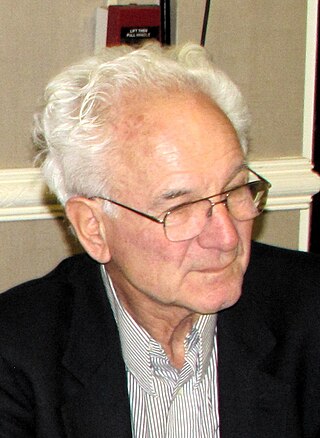
Peter H. Duesberg is a German-American molecular biologist and a professor of molecular and cell biology at the University of California, Berkeley. He is known for his early research into the genetic aspects of cancer. He is a proponent of AIDS denialism, the claim that HIV does not cause AIDS.

A retrovirus is a type of virus that inserts a DNA copy of its RNA genome into the DNA of a host cell that it invades, thus changing the genome of that cell. After invading a host cell's cytoplasm, the virus uses its own reverse transcriptase enzyme to produce DNA from its RNA genome, the reverse of the usual pattern, thus retro (backwards). The new DNA is then incorporated into the host cell genome by an integrase enzyme, at which point the retroviral DNA is referred to as a provirus. The host cell then treats the viral DNA as part of its own genome, transcribing and translating the viral genes along with the cell's own genes, producing the proteins required to assemble new copies of the virus. Many retroviruses cause serious diseases in humans, other mammals, and birds.
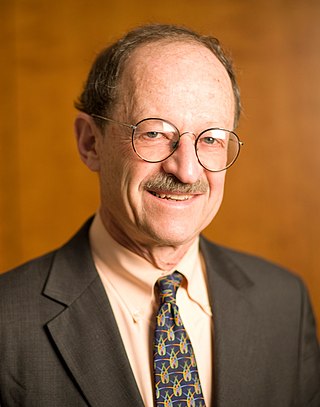
Harold Eliot Varmus is an American Nobel Prize-winning scientist. He is currently the Lewis Thomas University Professor of Medicine at Weill Cornell Medicine and a senior associate at the New York Genome Center.

Howard Martin Temin was an American geneticist and virologist. He discovered reverse transcriptase in the 1970s at the University of Wisconsin–Madison, for which he shared the 1975 Nobel Prize in Physiology or Medicine with Renato Dulbecco and David Baltimore.

John Michael Bishop is an American immunologist and microbiologist who shared the 1989 Nobel Prize in Physiology or Medicine with Harold E. Varmus and was co-winner of 1984 Alfred P. Sloan Prize. He serves as an active faculty member at the University of California, San Francisco (UCSF), where he also served as chancellor from 1998 to 2009.
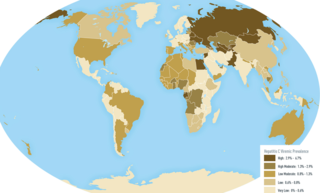
An oncovirus or oncogenic virus is a virus that can cause cancer. This term originated from studies of acutely transforming retroviruses in the 1950–60s, when the term "oncornaviruses" was used to denote their RNA virus origin. With the letters "RNA" removed, it now refers to any virus with a DNA or RNA genome causing cancer and is synonymous with "tumor virus" or "cancer virus". The vast majority of human and animal viruses do not cause cancer, probably because of longstanding co-evolution between the virus and its host. Oncoviruses have been important not only in epidemiology, but also in investigations of cell cycle control mechanisms such as the retinoblastoma protein.
Rous sarcoma virus (RSV) is a retrovirus and is the first oncovirus to have been described. It causes sarcoma in chickens.

Francis Peyton Rous was an American pathologist at the Rockefeller University known for his works in oncoviruses, blood transfusion and physiology of digestion. A medical graduate from the Johns Hopkins University, he was discouraged to become a practicing physician due to severe tuberculosis. After three years of working as an instructor of pathology at the University of Michigan, he became dedicated researcher at the Rockefeller Institute for Medical Research for the rest of his career.
The gag-onc fusion protein is a general term for a fusion protein formed from a group-specific antigen ('gag') gene and that of an oncogene ('onc'), a gene that plays a role in the development of a cancer. The name is also written as Gag-v-Onc, with "v" indicating that the Onc sequence resides in a viral genome. Onc is a generic placeholder for a given specific oncogene, such as C-jun..
v-Src is a gene found in Rous sarcoma virus (RSV) that encodes a tyrosine kinase that causes a type of cancer in chickens.

The direct repeat 1 (dr1) element is an RNA element commonly found in the 3' UTR of Avian sarcoma, Rous sarcoma and Avian leukosis viruses. dr1 is required for efficient viral replication and is thought to be involved in genomic RNA packaging although this may not be its only role.
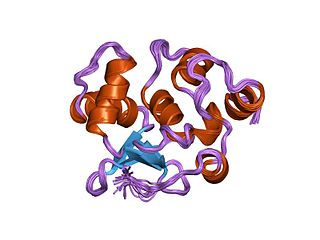
In the field of molecular biology, the ETSfamily is one of the largest families of transcription factors and is unique to animals. There are 29 genes in humans, 28 in the mouse, 10 in Caenorhabditis elegans and 9 in Drosophila. The founding member of this family was identified as a gene transduced by the leukemia virus, E26. The members of the family have been implicated in the development of different tissues as well as cancer progression.
Avian sarcoma leukosis virus (ASLV) is an endogenous retrovirus that infects and can lead to cancer in chickens; experimentally it can infect other species of birds and mammals. ASLV replicates in chicken embryo fibroblasts, the cells that contribute to the formation of connective tissues. Different forms of the disease exist, including lymphoblastic, erythroblastic, and osteopetrotic.
Retroviral matrix proteins are components of envelope-associated capsids of retroviruses. These proteins line the inner surface of viral envelopes and are associated with viral membranes.
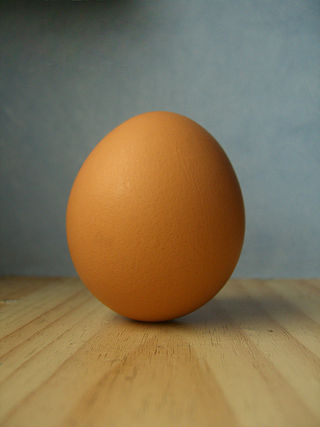
Chickens and their eggs have been used extensively as research models throughout the history of biology. Today they continue to serve as an important model for normal human biology as well as pathological disease processes.
Joan S. Brugge is the Louise Foote Pfeiffer Professor of Cell Biology and the Director of the Ludwig Center at Harvard Medical School, where she also served as the Chair of the Department of Cell Biology from 2004 to 2014. Her research focuses on cancer biology, and she has been recognized for her explorations into the Rous sarcoma virus, extracellular matrix adhesion, and epithelial tumor progression in breast cancer.
Sandra L. Quackenbush is an American virologist working as the associate dean of academic and student affairs and professor of retrovirology at the Colorado State University College of Veterinary Medicine and Biomedical Science. Her research interests include viral pathogenesis, with emphasis in viral-induced oncogenesis.
Karen Beemon is an American molecular biologist and professor of biology at Johns Hopkins University known for her research on RNA viruses and viral oncogenesis.
Harry Rubin – February 2, 2020) was an American cell biologist and virologist. He is known for his experimental research on oncoviruses and how cellular microenvironment and cellular aging affect the regulation of cancerous tumors.
Dennis John O'Callaghan is an American virologist, immunologist, and biochemist. He is an internationally recognized expert on the molecular biology of the equine herpesviruses.
References
- ↑ American Men and Women of Science , Thomson Gale
- ↑ Vogt, PK; Rubin H (1961). "Localization of infectious virus and viral antigen in chick fibroblasts during successive stages of infection with Rous sarcoma virus". Virology. 13 (4): 528–44. doi:10.1016/0042-6822(61)90284-7. PMID 13781861.
- ↑ Rubin, H; Vogt PK (1962). "An avian leukosis virus associated with stocks of Rous sarcoma virus". Virology. 17: 184–94. doi:10.1016/0042-6822(62)90096-x. PMID 14494905.
- ↑ Vogt, PK; Rubin H (1962). "The cytology of Rous sarcoma virus infection". Cold Spring Harb Symp Quant Biol. 27: 395–405. doi:10.1101/sqb.1962.027.001.037. PMID 13997686.
- ↑ "TSRI Faculty website".
- ↑ "TSRI press release".
- ↑ Ishizaki, R; Vogt PK. (1966). "Immunological relationships among envelope antigens of avian tumor viruses". Virology. 30 (3): 375–87. doi:10.1016/0042-6822(66)90116-4. PMID 4288417.
- ↑ Vogt, PK; Ishizaki R (1966). Burdette, WJ (ed.). "Criteria for the classification of avian tumor viruses". Viruses Inducing Cancer. Salt Lake City: University of Utah Press: 71–90.
{{cite journal}}: Cite journal requires|journal=(help) - ↑ Vogt, PK; Ishizaki R (1966). "Patterns of viral interference in the avian leukosis and sarcoma complex". Virology. 30 (3): 368–74. doi:10.1016/0042-6822(66)90115-2. PMID 4288416.
- ↑ Vogt, PK (1963). "The Cell Surface in Tumor Virus Infection". Cancer Res. 23: 1519–27. PMID 14072691.
- ↑ Vogt, PK; Luykx N (1963). "Observations on the surface of cells infected with Rous sarcoma virus". Virology. 20: 75–87. doi:10.1016/0042-6822(63)90142-9. PMID 13997684.
- ↑ Toyoshima, K; Vogt PK (1969). "Temperature sensitive mutants of an avian sarcoma virus". Virology. 39 (4): 930–1. doi:10.1016/0042-6822(69)90030-0. PMID 4311641.
- ↑ Duesberg, PH; Vogt PK (1970). "Differences between the ribonucleic acids of transforming and nontransforming avian tumor viruses". Proc Natl Acad Sci U S A. 67 (4): 1673–80. Bibcode:1970PNAS...67.1673D. doi: 10.1073/pnas.67.4.1673 . PMC 283411 . PMID 4321342.
- ↑ "The Nobel Prize in Physiology or Medicine 1989". NobelPrize.org.
- ↑ Duesberg, PH; Bister K; Vogt PK (1977). "The RNA of avian acute leukemia virus MC29". Proc Natl Acad Sci U S A. 74 (10): 4320–4. Bibcode:1977PNAS...74.4320D. doi: 10.1073/pnas.74.10.4320 . PMC 431932 . PMID 200913.
- ↑ Maki, Y; Bos TJ; Davis C; Starbuck M; Vogt PK (1987). "Avian sarcoma virus 17 carries the jun oncogene". Proc Natl Acad Sci U S A. 84 (9): 2848–52. Bibcode:1987PNAS...84.2848M. doi: 10.1073/pnas.84.9.2848 . PMC 304757 . PMID 3033666.
- ↑ Chang, HW; Aoki M; Fruman D; Auger KR; Bellacosa A; Tsichlis PN; Cantley LC; Roberts TM; Vogt PK (1997). "Transformation of chicken cells by the gene encoding the catalytic subunit of PI 3-kinase". Science. 276 (5320): 1848–50. doi:10.1126/science.276.5320.1848. PMID 9188528.
- ↑ "Jung Prize Laureates".
- ↑ "Paul Ehrlich and Ludwig Darmstaedter Prize Laureates".
- ↑ "Cancer Research Cover June 15, 1989" (PDF).
- ↑ Vogt, Peter K. (1992). "A transcription factor becomes oncogenic". Cancer. 69 (10): 2610–2614. doi: 10.1002/1097-0142(19920515)69:10<2610::AID-CNCR2820691035>3.0.CO;2-J . PMID 1568185.
- ↑ "2010 Prize: Peter K. Vogt, Ph.D." 28 March 2017.
- ↑ "Pezcoller-AACR International Award for Extraordinary Achievement in Cancer Research". Archived from the original on 2018-02-08. Retrieved 2018-02-07.
- ↑ "About the Meeting: IHV Meeting". somvweb.som.umaryland.edu.
- ↑ "Scientific Prize". AMERICAN-ITALIAN CANCER FOUNDATION.
- ↑ "The Louisa Gross Horwitz Prize". Columbia University Irving Medical Center. June 14, 2018.
- ↑ "Peter K. Vogt". www.nasonline.org.
- ↑ "APS Member History". search.amphilsoc.org.
- ↑ "American Academy of Microbiology".
- ↑ "Leopoldina Member directory".
- ↑ "Directory".
- ↑ "Peter K. Vogt". American Academy of Arts & Sciences. 9 October 2023.
- ↑ "Our Team – National Foundation for Cancer Research" . Retrieved 2018-03-31.
- ↑ "Gallery website".